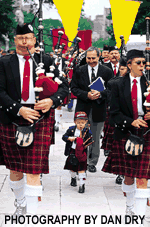
Was
it a surprise to you that change
was
so painful?
In the abstract, no. But it's very hard to really understand the
feelings until you see them. Despite the pain, I believe that
the institutional self-examination and the changes that resulted
were necessary. I believed, and I still do, that as the university
that offers the very best liberal education, Chicago has the opportunity--and
the responsibility--to demonstrate the value of such an education
and to attract the most talented and committed students. When
students who could attend any college or university choose the
place that is known for providing the best liberal education,
then it is a victory for the cause of liberal education.
 |
| Let
the Sonnenschein in |
We've
made great progress towards being in the position that we should
be. Our faculty has become even stronger. We've garnered financial
support, and we're using that support to build new and needed
facilities that allow us to expand and enhance academic programs
and campus life. These successes reveal a university that is confident
and that holds great promise. It is stronger to say, "We are a
special place with remarkable values; we are doing everything
possible to support those values and to ensure their continuation
in the very long term," than to say, "We're a special place; it's
very tough; we're doing the best we can."
Is
there anything that you wish you had done differently in getting
the University to this stage?
There
are, of course, lots and lots of things that you do wrong, because
there are so many things to do. You miss writing a letter of thanks.
You aren't there at a time when you're especially needed. You
don't realize that there's a particular group of people who are
deeply concerned about an action, and you do not explain the action
well enough. You make wrong judgments.
But when I think about regrets in the larger sense, I see them
as the flip sides of the accomplishments. I think often about
whether we could have accomplished as much as we have accomplished
with less pain and with less fear.
If
doing these things more slowly would have meant less pressure,
it also would have meant a much longer period of activity that
is essentially very hard for the community. Ultimately, this is
work that had to be done for our University to remain as strong
as it's been, to continue to play the leadership role that we
have always played in higher education. And remember, because
of our special values, this is important for all of higher education.
In
short, we have moved with deliberate speed, and this has had costs
and benefits.
Was
there a part of being Chicago's president that you found more
enjoyable than you'd expected?
Beth
and I enjoyed playing host more than either of us would have
anticipated. It is extraordinary the number of people you wind
up hosting for the University in your home. Some of these people
are people whom we'd met before, but as president you meet them
in a most personal and wonderful way. Our guests ranged from
former members of the faculty, such as Saul Bellow, George Schultz,
and Milton Friedman, to other notables, such as Catherine Malfitano,
Toni Morrison, Kay Graham, Prime Minister Obuchi, Robert Redford,
Daniel Barenboim, and Jim Watson. It's wonderful to be in a
position where you could invite anybody in the world to dinner
and there's a fairly good chance that they will say yes. Hosting
Presidents Ford and Clinton, and Vice President Gore, was also
an honor.
It's
great fun and it's a great opportunity to share with your community--with
students, with faculty, with trustees, with staff, and with
alumni and friends of the University. It was perhaps not so
much a surprise that we did so much hosting; the real surprise
was how much fun it was.



![]()

